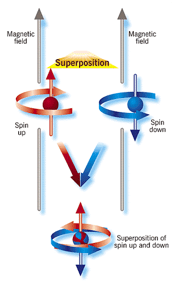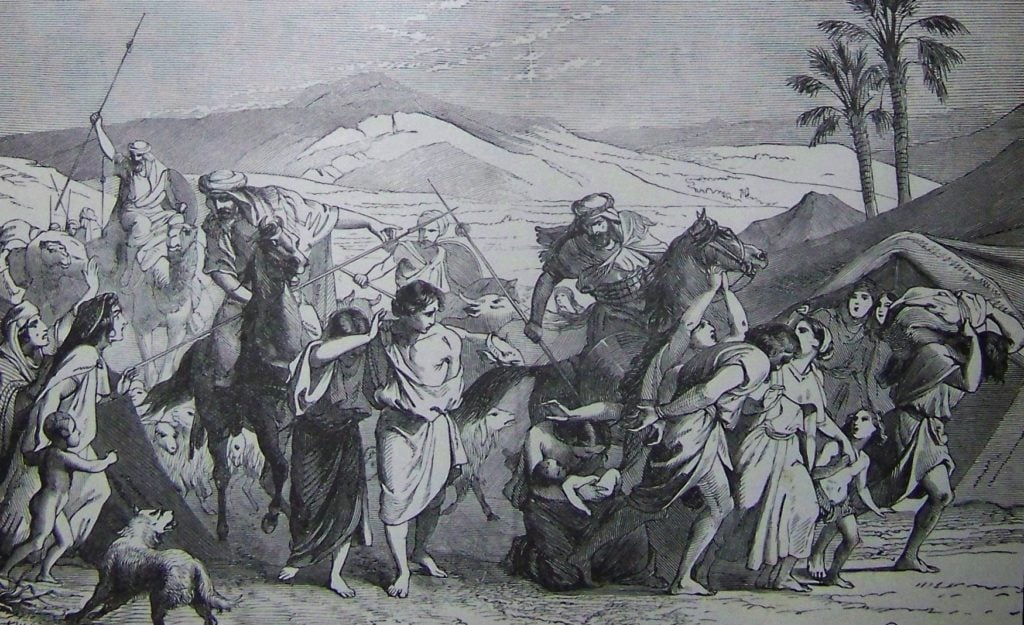The Torah portion Bechukotai (Leviticus 26:3–27:34), the last portion in the book of Leviticus (Vayikra), is a harsh parashah… Frightening prophesies of the exile and tragedies that would befall children of Israel make it very difficult to read. Traditionally, no one is called to the Torah for the reading of the verses containing the admonitions (tocheichah), but the reader (ba’al kore) makes the blessings himself without his name being called.
The difficulties with this parashah do not stop here. The verses of admonitions (that are called in the vernacular as curses) revolve around a mysterious word, keri, spelled Quf-Resh-Yud. This word shows up for the first time here, it is repeated seven times, never to be found in the whole of Scriptures (Tanach) again. These are the verses containing this word:
-
And if ye walk unto Me keri…” (Leviticus 26:21)
-
And if in spite of these things ye will not be chastised unto Me, but will walk unto Me keri…” (Leviticus 26:23)
-
And then will I also walk unto you with keri…” (Leviticus 26:24)
-
And if ye will not for all this hearken unto Me, but walk unto Me with keri…” (Leviticus 26:27)
-
And then I will walk unto you with a fury of keri…” (Leviticus 26:28)
-
And they shall confess their iniquity, and the iniquities of their fathers, in their treachery which they committed against Me, and also for having walked unto Me with keri.” (Leviticus 26:40)
-
I also shall walk unto them with keri…” (Leviticus 26:41)
The word keri plays the central role in these admonitions because it is the condition on which the admonitions are based:
And if ye walk unto Me keri…”
Amazingly, the punishment is also summarized with the same word:
I, also shall walk unto them with keri…”

What does this word mean? Rabbi Shlomo Itzhaki (1040–1105) (Rashi), and Rabbi Shmuel Ben Meir (1085–c. 1158) (Rashbam), a leading French Tosafist and grandson of Rashi, derive the root of this word from the word kara, “to happen.” Thus, they translate keri as “casually” or “inconsistently.”

According to most commentators, this word connotes “casualness” or “happenstance.” In this understanding, if the nation serves G‑d haphazardly, inconsistently, it is counted as a sin. “If they walk casually with Me,” says G‑d, “I will walk casually with them.” This approach emphasizes the consistency of service and the fidelity of the relationship. In this regards, the sages stated that the “most important” verses in the Torah are not the Ten Commandments given with thunder and lightning, not even “Hear O’Israel,” but a commandment of a routine offering in the Temple—to bring one sheep in the morning and one sheep in the evening; and next day again, one sheep in the morning and one sheep in the evening; etc., which emphasizes the primary importance of the consistency of the Divine service.
Similarly, the consistency and the fidelity of the relationship is of utmost importance. Although the Torah does not forbid polygamy and, indeed, in biblical time, men were allowed to have more than one wife, Rabbi Gershom ben Judah, (c. 960-1040) known as the Rabbeinu Gershom, forbade polygamy in order to strengthen the fidelity of the relationship between G‑d and his bride, the nation of Israel. If Jewish men will not more than one wife in this world, the hope was that G‑d will not acquire another “wife,” i.e., another chosen nation.
According to Rabbi Bahya ben Asher ibn Halawa (1255-1340), known as Rabbeinu Bahya (Behaye), and Rabbi Chayim ben Moshe ibn Attar (1696-1743) known as the Ohr Hachaim, the word keri connotes an erroneous world-view ascribing everything to a blind chance, being oblivious to the Divine Providence. People subscribing to such weltanschauung refuse to see the proverbial writings on the wall attributing every event to a happenstance, a random fluke. The danger of such world-view is that when facing difficulty, a person will not see it as a punishment for his sins but ascribe his misfortune to the blind chance. Such a person will never repent.

Rabbi Shimshon Raphael Hirsch (1808-1888) interprets the word keri as “indifference” to G‑d’s will. Onkelos (c. 35–120 CE), among others, translates the word keri as “stubbornness.” Others translate this word as “contrary.” A good exposition of these opinions may be found on OU blog “Parshat Behar-Bechukotai: A Casual Curse” excerpted from Rabbi Shmuel Goldin’s ‘Unlocking The Torah Text: An In-Depth Journey Into The Weekly Parsha- Vayikra’ (I am grateful to my friend, Dr. Chaim Schield for bringing it to my attention.)
Allow me to offer a slightly different take on this word and the meaning of the admonitions in this Torah portion. First of all, let us note that the common thread of the translations offered by Rashi, Rashbam, Rabbeinu Bachya, and the Ohr Hachaim is randomness. As we shall see, the other translations fit into this general notion as well.

Let us consider two separate particles X and Y that, at the moment, are not interacting with each other. Each of these particles may be in one of two states ∣A〉 and ∣B〉. (It doesn’t matter what these states are; for an atom, the states can be “excited” or “not excited,” for electrons it may be “spin-up” or “spin-down,” for photons it may be vertical or horizontal polarization, for a qubit it can be 0 or 1, etc.) Each of these states is called a pure state. However, until measured, each particle is always in the state of superposition of states ∣A〉 and ∣B〉. (Remember the Schrödinger cat that is in blurred state of being dead and alive at the same time?)
Each particle is described by its own wavefunction that predicts the distribution of probabilities to find the particle in any particular state (or place). Consequently, the states of individual particles are uncertain and, when measured, assume a random value. Say, the particles are electrons, which have a spin. Each of these particles may have a 50% probability to be found “spinning” clockwise (“spin-up,” or |↑⟩), or counterclockwise (“spin-down,” |↓⟩). Before we measure the spin, its value (direction) is uncertain, as it is in the state of superposition of “spin-up” and “spin-down.” When we measure the spin, we force the collapse of the wavefunction causing the spin to randomly assume either the direction “spin-up” or “spin-down.” If we repeat this experiment many times, we’ll notice that roughly half the time we’ll find the state in the “spin-up” direction and half the time in the “spin-down” direction.

Now let us collide two electrons together. After the collision, electrons recoil and continue moving away from each other. However, having interacted, they become entangled. Both electrons are now described by a single wavefunction which provides the information about the pair. That means their states are no longer random; the states are now correlated. Say, we measure the spin of one electron and find it rotating clockwise (spin-up, or |↑⟩). According to the law of angular momentum conservation, we can now be certain that the other electron is “rotating” counterclockwise (i.e., it has spin-down,” or |↓⟩). The entangled pair of electrons is really a single object albeit separated in space.
Armed with this minimal knowledge of quantum entanglement we can now understand the meaning of the word keri and the admonitions dependent on it. As I suggested earlier, I translate the word keri as “random.” Having a common root with the word kara, “to happen,” it connotes a random happenstance. This dovetails with Rashi’s interpretation.
Until the nation of Israel has been chosen by G‑d to be His nation, G‑d and Israelites were not entangled. Occasionally, there arose spiritual giants like Abraham, Isaac, and Jacob that committed to G‑d and served Him consistently. But other than that, the Divine worship of the children of Israel was haphazard. Talmud tells us they served idols in Egypt. G‑d’s relationship with the Israelites was not consistent either. G‑d appeared, on occasion, to our forefathers Abraham, Isaac, and Jacob; He revealed Himself in the Burning Bush to Moses but, by and large, he left Israelites forsaken in the Egyptian exile, until He heard their cries and took them out of Egypt.
This relationship changed at the time when G‑d chose Israelites to be His people and we became His chosen nation. At that point, the nation of Israel became entangled with G‑d. No longer was the relationship random. It demanded consistency, fidelity, and mutual commitment.
The theme of entanglement goes as a thread through the entire book of Leviticus. Often, as a rationale for giving a particular precept, G‑d states, “…for I am the Lord your G‑d,” as if saying, “Remember, we are entangled, and that is why you must do so and so.” (See for example, Leviticus 11:44; 18:2,4,30; 19:3,4,10,24,31,34,36; 20:7,24; 23:22,43; 25:17,38,55; 26:1,13.) Thus G‑d proclaims:
For I am the Lord your G‑d; sanctify yourselves therefore, and be ye holy; for I am holy.” (Leviticus 11:44)
And further:
Sanctify yourselves therefore, and be ye holy; for I am the Lord your G‑d!” (Leviticus 20:7)
The obvious question is, this is a non sequitur. Of course, G‑d is holy—He is G‑d, the source of all holiness! From where does it follow that we, mere mortals, must be holy? The answer is, it follows from our entanglement with G‑d. Since we are entangled, if G‑d is holy, so should we be holy—we share correlated states.
Now we can understand the admonitions of the Torah portion Bechukotai. If we consistently follow G‑d’s will, G‑d’s commandments, we maintain our entanglement with G‑d, which automatically assures all blessings:
If ye walk in My statutes, and keep My commandments, and do them; then I will give your rains in their season, and the land shall yield her produce, and the trees of the field shall yield their fruit. And your threshing shall reach unto the vintage, and the vintage shall reach unto the sowing time; and ye shall eat your bread until ye have enough, and dwell in your land safely. And I will give peace in the land, and ye shall lie down, and none shall make you afraid; and I will cause evil beasts to cease out of the land, neither shall the sword go through your land. And ye shall chase your enemies, and they shall fall before you by the sword. And five of you shall chase a hundred, and a hundred of you shall chase ten thousand; and your enemies shall fall before you by the sword. And I will have respect unto you, and make you fruitful, and multiply you; and will establish My covenant with you. And ye shall eat old store long kept, and ye shall bring forth the old from before the new. And I will set My tabernacle among you, and My soul shall not abhor you. And I will walk among you, and will be your G‑d, and ye shall be My people. (Leviticus 26:3-13)
“And I will walk among you and will be your G‑d, and ye shall be My people,” i.e., “You and I will be entangled,” says G‑d.
Entanglement, however, presupposes correlated state, not random states. When Jews insist on their independence from G‑d, on their state being uncorrelated with G‑d’s state, it implies randomness—keri.
This is why, when Jews walk before G‑d with keri—randomness—their relationship with the Divine becomes casual, their Divine service inconsistent, their state is no longer correlated with the Divine, and the entanglement erodes. In the language of quantum mechanics, the states become decoherent, which destroys the entanglement. This is contrary to the will of G‑d (see translations of keri according to Rav Hirsh). As people disentangle themselves from G‑d, G‑d automatically gets disentangled from the people—entanglement is a two-way street. “I also shall walk unto them with keri…”
When that happens, all Hell breaks loose. When Jews get disentangled from G‑d, they become deprived of the Divine protection and become prey to the forces of nature and nations of the world. The admonitions—the prophecies of future misfortunes (G‑d should spare us!) —are not so much prophesies as they are “scientific” predictions, as they follow automatically, as a necessary consequence of disentanglement from G‑d. These are the rule of the game.
Luckily, our entanglement with G‑d, our bond with Him is unbreakable. It can stretch a bit, get thinner at times but, ultimately, we are inseparable from our Creator. Therefore, the admonitions end on the positive note of hope:
And yet for all that, when they are in the land of their enemies, I will not reject them, neither will I abhor them, to destroy them utterly, and to break My covenant with them; for I am the Lord their G‑d. But I will for their sakes remember the covenant of their ancestors, whom I brought forth out of the land of Egypt in the sight of the nations, that I might be their G‑d: I am the Lord. (Leviticus 26:44-45)
Today, when we find ourselves in the midst of the COVID-19 plague, we must strengthen our entanglement with G‑d (while practicing social distancing with other humans), and pray that the cure should come immediately.

Did anyone of you ever think that it may actually be a name, you’re trying to guess the meaning when their is no meaning because it is in fact a name!
Yes its my name. I do try to walk as Keri.
Thank you!!!!!